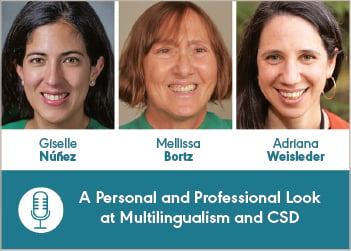Self-Identify as a Multilingual Service Provider (MSP)
Bilingual and multilingual service providers (MSPs) are in increasing demand. Self-identifying can be a productive way to find professional community and support multilingual clients.
What does it mean to self-identify?
Professionally self-identifying as an MSP means that you publicly highlight your ability to use multiple languages during audiology or speech-language pathology service delivery.
What can self-identification involve?
By self-identifying, you can explore specific opportunities to leverage your skills:
- Communicate to your clients, peers, and employers that you can use multiple languages.
- Update your ASHA member profile. ASHA uses demographic data to (a) better advocate for your needs on the local, state, and federal level and (b) build more resources for the MSP community.
- Volunteer on ASHA committees. Share your expertise with colleagues, and support initiatives important to users of more than one language.
- Include the languages you use on your ProFind listing. Make it easy for employers and clients to find you.
- Find community support in a Multicultural Constituency Group (MCCG).
- Join a Special Interest Group (SIG) to participate in discipline-wide conversations. Your multilingual perspective is important in any and every SIG. To contribute to discourse about the power of multilingualism, consider SIG 14, Cultural and Linguistic Diversity, and/or SIG 17, Global Issues in Communication Sciences and Related Disorders.
Multilingual Americans may feel more comfortable discussing educational, medical, or personal issues in languages other than English.
Sources:
- American Speech-Language-Hearing Association. (2023). Profile of ASHA multilingual service providers – 2023 [PDF]
- U.S. Census Bureau. (2023). American Community Survey.
Who should self-identify?
Are you multilingual but not sure whether you should self-identify? If you use more than one language during professional and/or clinical service delivery, then you fit ASHA’s current definition of an MSP.
You may already engage in MSP activities—use the Checklist of Tasks and Behaviors for Audiologists or SLPs Who Identify as a Multilingual Service Providers at the bottom of ASHA’s Multilingual Service Provider webpage to identify strengths and areas for growth.
For in-depth data about self-identified ASHA MSPs, dive into ASHA’s 2023 Multilingual Service Providers Survey Results [PDF]. ASHA is currently using the survey results to advocate for MSPs and create new recruitment and retention resources.
If you have questions, email multicultural@asha.org to connect with a member of the ASHA’s Office of Multicultural Affairs.
Listen to MSP Perspectives
MSPs discuss how language and identity intersect with their work.
Why self-identify as an MSP?
Self-identification may lead to benefits like these:
- increased demand for your expertise
- access to a broader set of clients
- potential for increased earnings
Self-identification may benefit clients in the following ways:
- putting you in a stronger position to serve as a community resource
- increasing the likelihood that clients can receive services with a language-matched provider
- providing a meaningful layer of care by communicating in clients’ heritage languages
ASHA resources for you
Explore resources to help you with your career and practice.
- ASHA Career Portal Job Board: Search for open bilingual and multilingual positions within the professions.
- Multilingual Service Delivery in Audiology and Speech-Language Pathology: Find links to phonemic inventories and guides to key topics in MSP practice.
- Learn more about Collaborating with Interpreters, Transliterators, and Translators.













